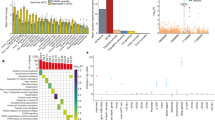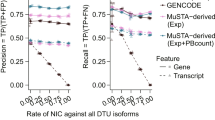Abstract
Intragenic deletions of TSG101, the human homolog of a mouse gene (tsg101) that acts to suppress malignant cell growth, were reported in human breast tumours. We screened TSG101 for somatic mutations in DNA and RNA samples isolated from a variety of common human malignancies, EBV-immortalised B-cells, and normal lung parenchyma. Intragenic TSG101 deletions in RNA transcripts were frequently found in all types of samples. Analysis of DNA failed to show genomic rearrangements corresponding to transcripts containing deletions in the same samples. The breakpoints of most transcript deletions coincide with genuine or cryptic splice site sequences, suggesting that they result from alternative or aberrant splicing. A similar spectrum of transcript deletions has previously been described in the putative tumour suppressor gene FHIT. We analysed FHIT in the same series of RNA samples and detected truncated FHIT transcripts frequently in both tumour and normal tissues. In addition, transcripts from TSG101, FHIT and seven other genes were analysed in RNA isolated from normal peripheral blood lymphocytes. Large TSG101 and FHIT intragenic transcript deletions were detected and these appeared to be the predominant transcript in `aged' lymphocytes. Similar alterations were not detected in transcripts of the other genes which were analysed. Our findings demonstrate that truncated TSG101 and FHIT transcripts are commonly detected in both normal and malignant tissues and that a significant fraction of these are likely to be the result of aberrant splicing. While we cannot exclude that alterations in TSG101 and FHIT occur during cancer development, our data indicate that in this context the commonly observed transcript abnormalities are misleading.
This is a preview of subscription content, access via your institution
Access options
Subscribe to this journal
Receive 50 print issues and online access
$259.00 per year
only $5.18 per issue
Buy this article
- Purchase on Springer Link
- Instant access to full article PDF
Prices may be subject to local taxes which are calculated during checkout
Similar content being viewed by others
Author information
Authors and Affiliations
Rights and permissions
About this article
Cite this article
Gayther, S., Barski, P., Batley, S. et al. Aberrant splicing of the TSG101 and FHIT genes occurs frequently in multiple malignancies and in normal tissues and mimics alterations previously described in tumours. Oncogene 15, 2119–2126 (1997). https://doi.org/10.1038/sj.onc.1201591
Received:
Revised:
Accepted:
Issue Date:
DOI: https://doi.org/10.1038/sj.onc.1201591
Keywords
This article is cited by
-
Genetic variants in EBV reactivation-related genes and the risk and survival of breast cancer
Tumor Biology (2016)
-
Placenta-specific novel splice variants of Rho GDP dissociation inhibitor β are highly expressed in cancerous cells
BMC Research Notes (2012)
-
PTEN transcript variants caused by illegitimate splicing in “aged” blood samples and EBV-transformed cell lines
Human Genetics (2010)
-
Fragile histidine triad protein: structure, function, and its association with tumorogenesis
Journal of Cancer Research and Clinical Oncology (2010)
-
Identification of a human TFPI-2 splice variant that is upregulated in human tumor tissues
Molecular Cancer (2007)



